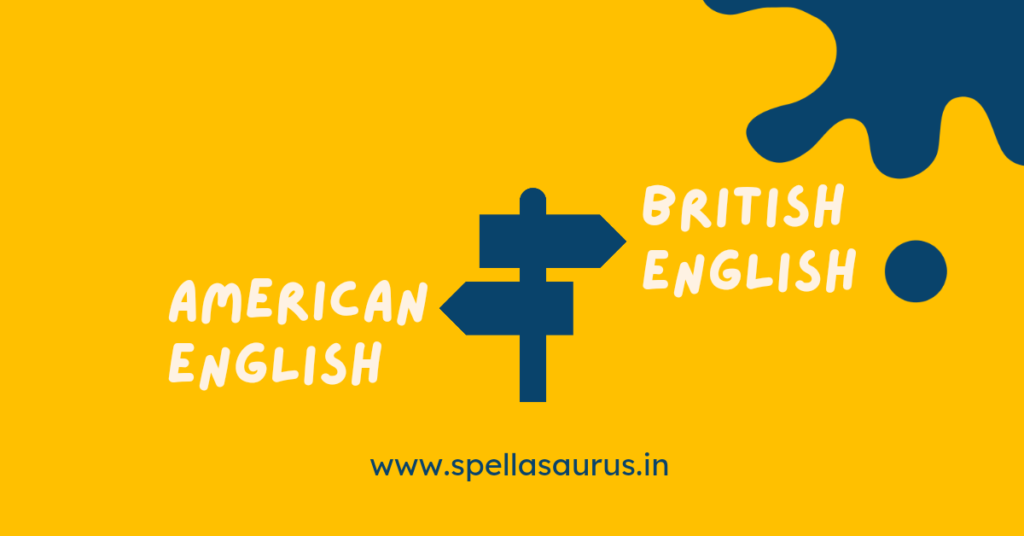Have you ever struggled to understand the differences in pronunciation between American English and British English? Do you think British English is harder to grasp in comparison to American English? However, American English and British English are slightly different in pronunciation and sometimes different in spellings too. The vocabulary also changes relatively between American English and British English. In this article, we’ll go through the differences between the two in greater depth.
We will cover the differences between vocabulary, spellings, pronunciation, and grammar in more detail.
Vocabulary
Because of the variance in the language, there is a diverse vocabulary in American English and British English, which means that the same items/objects are named and referred to differently in the respective languages. The following is a list of objects that are addressed differently in American English and British English.
| American English | British English |
| Garbage | Rubbish |
| Elevator | Lift |
| Vacation | Holiday |
| Truck | Lorry |
| Sweater | Jumper |
| Cookie | Biscuit |
| French Fries | Chips |
| Line | Queue |
| Parking Lot | Car Park |
| Silverware | Cutlery |
| Football | Soccer |
| Apartment | Flat |
| College | University |
| Theater | Theatre |
| Chips | Crisps |
| Movies | Cinema |
| Soda | Soft Drink |
| Sneakers | Trainers |
| Mailbox | Postbox |
| Band-aid | Plaster |
| Drugstore | Chemist’s |
| Pants | Trousers |
Spellings
Do you think the spelling of ‘color’ should have ‘u’? British English spellings reflect the influence of Latin and French words. Noah Webster who is one of the biggest contributors to American English wanted to improve and differentiate American English from British English, so he changed a few spellings in American English.
Here are some rules that differentiate the spellings of American English from British English.
- The words that end in -our in British English, are spelled without ‘u’ in American English.
- The words that end in -re in British English, end in -er in American English.
- The verbs that end in -ise in British English, end in -ize in American English.
The following is the list of words that spell differently in both American English and British English.
| American English | British English |
| Color | Colour |
| Behavior | Behaviour |
| Theater | Theatre |
| Meter | Metre |
| Organize | Organise |
| Traveled | Travelled |
| Honor | Honour |
| Favorite | Favourite |
| Apologize | Apologise |
| Capitalize | Capitalise |
| Theorize | Theorise |
| Liter | Litre |
Regular vs Irregular Verbs
We have often observed the combination of American English and British English in a speech that can be easily overlooked, however, we don’t neglect it in the written form.
While speaking a language, we might end up using a combination of both languages (American & British English) whereas while we write a language we have to be certain about following the rules of one system.
In British English, the past tense of many verbs are irregular while American English emphasizes regular verbs in the past tense.
| American English | British English |
| Leaped | Leapt |
| Dreamed | Dreamt |
| Burned | Burnt |
| Learned | Learnt |
| Leaned | Leant |
| Smelled | Smelt |
| Spilled | Spilt |
| Spoiled | Spoilt |
| Quit | Quitted |
| Wet | Wetted |
| Dove | Dived |
Pronunciation
We have frequently experienced the difference in pronunciation of the words in American English and British English. Let us check how they are different and how you can differentiate between the two.
Silent r
In British English, in any spelling, when the letter r comes after the vowel in the syllable, the letter r is not pronounced. While in American English, the letter r is pronounced.
Car
American English: kAHR
British English: kAH
Hard
American English: hAHRd
British English: hAHd
Market
American English: mAHR-kuht
British English: mAH-kit
Were
American English: wUHR
British English: wUH
Ear
American English: IR
British English: IUH
Pure
American English: pyUR
British English: pyUUH
More
American English: mOR
British English: mAW
Chair
American English: chAIR
British English: chEUH
Water
American English: wAW-tuhr
British English: wAW-tuh
Vowel sounds
Many vowel sounds are very similar in American English and British English pronunciation. However, 8 vowel sounds differ from each other.
Shock
American English: shAHk
British English: shOk
Lost
American English: lAWst
British English: lOst
Want
American English: wAWnt
British English: wOnt
Shop
American English: shAHp
British English: shOp
Carry
American English: kAIR-ee
British English: kAr-ee
Early
American English: UHR-lee
British English: UHR-lee
Bird
American English: bUHRd
British English: bUHRd
Caught
American English: kAWt
British English: kAWt
Talking
American English: tAW-king
British English: tAW-king
Horse
American English: hORs
British English: hAWs
Pass
American English: pAs
British English: pAHs
Spare
American English: spAIR
British English: spEUH
Fear
American English: fIR
British English: fIUH
Deer
American English: dIR
British English: dIUH
Throw
American English: thrOH
British English: thrOH
Stones
American English: stOHnz
British English: stOHnz
Heard
American English: hUHRd
British English: hUHRd
Conclusion
We have understood the significant difference between American English and British English. What did you learn from this article? Let me know in the comment section below.

